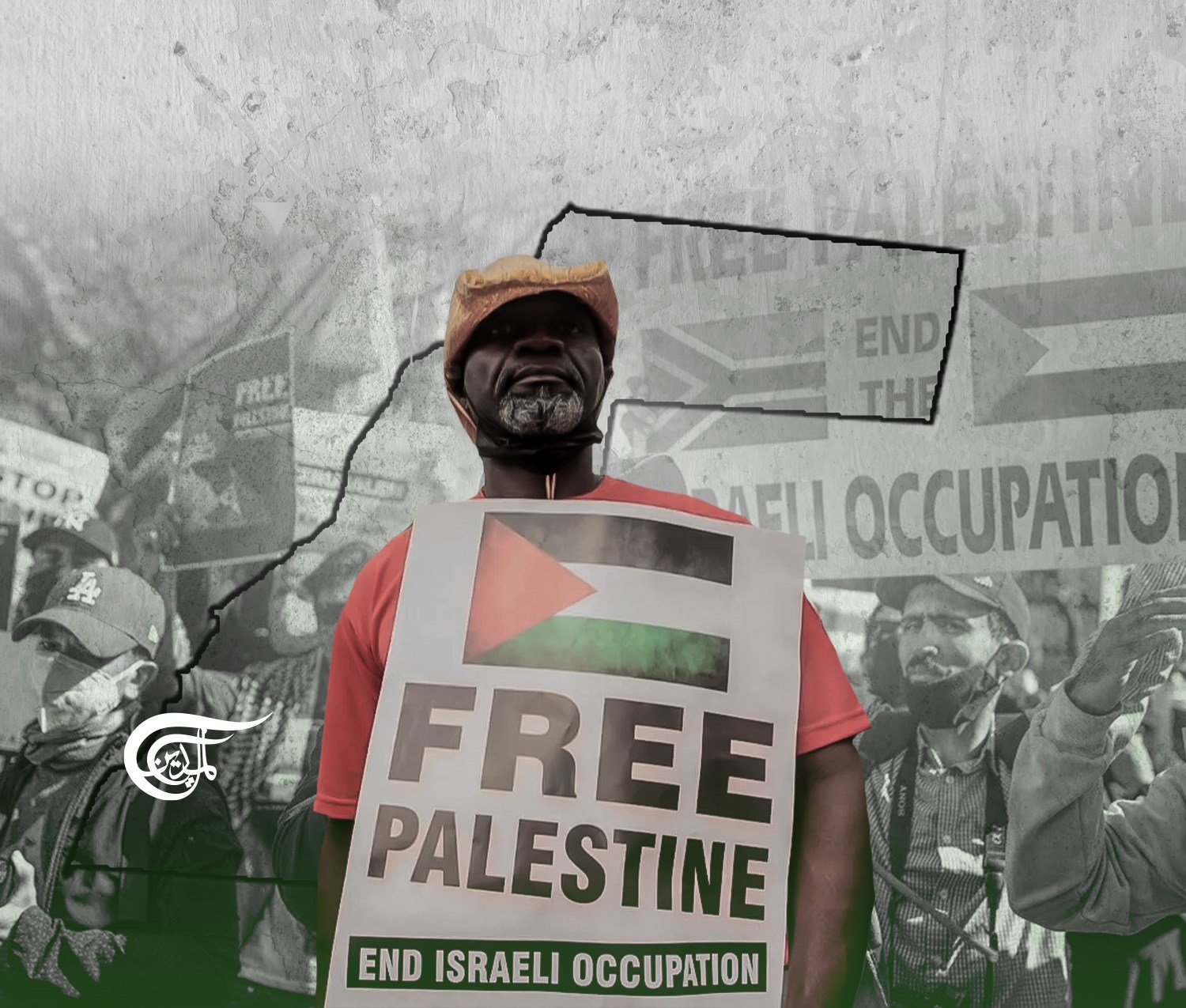We will not be assured as long as Western Sahara, Palestine remain under occupation: South African President
“If there is any country or countries that can comprehend the suffering and the struggle for freedom and independence of Palestine, it is the African continent and the people of Africa."
South Africa’s President Cyril Ramaphosa said, at the 6th congress of the ruling party at the African National Congress, that his party and his country could not be assured as long as Western Sahara and Palestine remain under occupation.
-

South Africa’s President Cyril Ramaphosa
“We cannot be assured while Western Sahara remains under occupation. We cannot accept that occupation and oppression is to be the fate of the Palestinian people,” he said to the participants at the conference held from July 28 to 31 in Johannesburg.
He further stated that “these are among the struggles that we need to take up with greater vigor if we are to contribute to building a better world."
The ANC conference was an opportunity for the 2000 participants to debate on various political positions the Party needed to have clear-cut positions on, including the solidarity with Western Sahara and Palestine, among others.
South Africa has remained a strong ally of Palestine, providing both material and public support for its liberation cause. It reaffirmed, on multiple occasions, its long-term and principled support for the Palestinian people, considering that security and stability in the Middle East are being “undermined by the continued occupation of Palestinian territories and the aggressive actions of the Zionist regime."
Speaking during the second meeting of the Palestinian Heads of Mission in Africa, held in the capital Pretoria in July 2022, South Africa’s Minister of International Relations and Cooperation, Naledi Pandor, expressed the South African government’s concerns that the Zionists’ ongoing occupation of significant portions of the West Bank and the development of new settlements there “are glaring examples of violations of international law."
Pandor called on the United Nations to classify the Zionist Entity as an "apartheid state", stressing that the United Nations General Assembly (UNGA) should establish a committee to verify whether it fulfills the requirements.
Underscoring that South Africans’ own struggle against systemic racism grants them the ability to understand the plight of the Palestinian people; Pandor, wearing a traditional Palestinian scarf, reiterated South Africa’s steadfast and unwavering commitment to the Palestinian cause, comparing it to the 20th-century struggle against white minority rule in South Africa.
-

South Africa’s Minister of International Relations and Cooperation, Naledi Pandor
Pandor said, “As oppressed South Africans, we experienced firsthand the effects of racial inequality, discrimination, and denial, and we cannot stand by while another generation of Palestinians is left behind."
“The Palestinian narrative evokes experiences of South Africa’s own history of racial segregation and oppression”, she added.
In this regard, Palestinian Foreign Minister Riad Malki, who attended the forum, made a declaration to the state-run South African Broadcasting Corporation (SABC) after the session.
He thanked South Africa for its support, also drawing parallels with the former apartheid government.
“We came here because every time we need support and encouragement, we look for reference; we come to the origin of the struggle for liberation, for independence, against colonization, here in South Africa”, Malki said. “If there is any country or countries that can comprehend the suffering and the struggle for freedom and independence of Palestine, it is the African continent and the people of Africa,” he added.
It is noteworthy that Pandor was the first representative of the South African government to denounce the assassination of Palestinian Al Jazeera journalist Shireen Abu Akleh in May by the Zionist forces during a raid on the West Bank. She also compared the violent disruption of her funeral procession by the Zionist police to the cruelty of the South African apartheid military.
After the aforementioned conference session, she told SABC that “we can’t leave the matter of Shireen Abu Akleh untouched."
“We will push the Palestinian cause at the UN General Assembly and we need also civil society to join us," Pandor said.
“Our principled position on Palestine has always been clear, consistent, and convergent with the international community," stressed Pandor, highlighting that the Zionist Entity “is continuing to occupy Palestine in complete defiance of its international obligations and relevant resolutions of the UN."
The South African Minister referred to a recent report by the Al-Mezan Centre for Human Rights, a civil organization with headquarters in the Gaza Strip, stating that up to 5,418 Palestinians have been killed by the Zionist military operations in the besieged Gaza Strip during the past 15 years, including 1,246 children and 488 women. In a similar vein, she slammed the cruelty of the Zionists, calling for deploying concerted efforts to end the sufferings of the Palestinians.
“These reports are significant in raising global awareness of the conditions that Palestinians are subjected to and they provide credence and support to an overwhelming body of factual evidence, all pointing to the fact that the Zionist Entity is committing crimes of apartheid and persecution against Palestinians," she pointed out.
Last month, South Africa urged the international community to hold the Zionist Entity accountable for the inhumane conditions that Palestinians have been subjected to. Last year, the plans of the Zionists to sneak quietly into the African Union as an observer state have been, spectacularly, backfired. The tireless efforts exerted by Algeria, alongside South Africa, and their friends to rescind the observer status granted to the Zionist Entity in the African Union (AU), have been crowned with success. The Zionist entity’s observer status in AU has been suspended on the second day of the 35th African Union Summit held in the Ethiopian capital, Addis Ababa, under the theme: “Strengthening Food Security: Accelerating the Development of Human, Social and Economic Capital in the African Continent."
It is noteworthy that after the first non-racial elections in 1994, the first Palestinian Embassy in South Africa was accredited in 1995, marking the beginning of diplomatic relations between the two friendly countries. Over the years, South Africa has attached great importance to its relationship with Palestine, which is underpinned by historic bonds of solidarity, friendship, and cooperation. South Africa’s support for the Palestinian cause conforms to the basic tenets of its foreign policy.
The South African government has remained a strong ally of Palestine, providing both material and public support for its liberation cause. It always refers to the close relations binding Arafat and late South African leader Nelson Mandela, slamming, in the strongest terms, the continued mistreatment of the Palestinians, including its longstanding policy of building illegal settlements. These include the following, among others:
At the multilateral level, particularly the United Nations, G77, Non-Alignment Movement, the African Union, BRICS, and IBSA, South Africa supports and lobbies for the independence and self-determination of Palestine. President Zuma appointed Former Minister Dr. Zola Skweyiya and Former Deputy Minister Dr. Aziz Pahad as His Special Envoys to convey his message of concern about the escalating violence against the people of Palestine. In addition, in 2002, South Africa granted a 5 million rand aid (about 500,000 US dollars), worth of aid that included medical equipment, enough water purification sachets for 2 million liters of water, bottled water, intravenous fluids, medicines, food, candles, and soap.
It has also pledged $1 million as humanitarian assistance to the people of Gaza following the 50-day aggression on Gaza in 2014.
Through the IBSA Partnership Program, South Africa has partly funded the construction of social development infrastructure projects in Palestine. In this regard, three such projects were initiated, namely: the Ramallah Indoor Sport Complex, officially inaugurated in October 2011; the Al Quds Red Crescent Hospital in Gaza launched in 2012, and People with Disabilities Project in Nablus City.
For their part, South African prominent figures, such as Desmond Tutu (an Anglican bishop and theologian known for his work as an anti-apartheid and human rights activist) and Ronnie Kasrils (politician, military commander, and former Minister for Intelligence Services from April 27, 2004, to September 25, 2008) have criticized the Zionists’ mistreatment of the Palestinians, drawing parallels between apartheid South Africa and the modern-day Zionist Entity.
The Congress of South African Trade Unions, which represents 1.2 million South African workers, has also accused the entity of practicing apartheid, calling for the boycott of all Israeli products.
During Gaza War (2008 - 2009), South Africa's Deputy Minister of Foreign Affairs Fatima Hajaig called on the Zionist Entity to put an end to military attacks and withdraw its forces from the "border" immediately, saying, "The South African government finds the continued siege on Gaza unacceptable as it does not allow humanitarian relief supply such as medicine, food, and water to reach the desperate people of Gaza." "The South African government unequivocally and in the strongest possible terms condemns the escalation of violence on the part of the «entity» brought about by the launching Saturday night of a ground invasion into Gaza," read a statement issued by the Department of Foreign Affairs after the ground offensive.
After the Gaza raid on May 31, 2010, the South African Department of International Relations and Cooperation also issued a statement strongly condemning all military aggression against innocent civilians, including those in the occupied West Bank and Gaza.
On the popular side, South Africans who have tasted the bitter fruit of apartheid, racism, and discrimination have a natural affinity with the Palestinians, who are subject to tyranny from the Zionists’ oppression. Whenever the Zionists strike Palestine, thousands of South Africans, from all races and creeds, take to the streets to stage demonstrations, vigils, marches, and boycott campaigns with the aim to express their unwavering solidarity with the defenseless Palestinians and denounce the terror that the Zionists unleash on them.
As for the Western Sahara cause, South Africa, which has fought for freedom and liberation and stood up to colonialism, has maintained a principled position on the right to self-determination for the Saharawi people as enshrined in the United Nations (UN) Charter and the African Union (AU) Constitutive Act. It also intensified its solidarity with the Polisario Front liberation movement, as they lead the people of Western Sahara in their quest for peace and independence.
Back in September 2004, South Africa recognized the SADR when it became clear that Morocco had ruled out any possibility for a referendum for Western Sahara in contravention of UN Security Council Resolution 1495 of 2003.
Diplomatic ties between both countries have been cemented with the SADR having a residential Embassy in Pretoria, whilst South Africa’s Ambassador to Algeria is accredited to the SADR. Political and development assistance is rendered to the SADR through the African Renaissance Fund (ARF). In addition, areas of cooperation between both countries exist in the field of diplomatic consultations, arts and culture, youth sports development, as well as humanitarian relief and landmine removal.
The prolonged suffering of the people of Western Sahara and the lack of progress in finding a durable solution to the struggle for self-determination in the territory on the basis of international legality remains a major concern for the South African Government.

 Hana Saada
Hana Saada
 10 Min Read
10 Min Read












